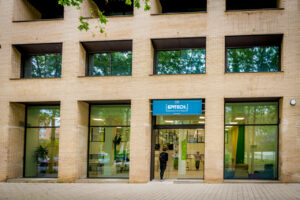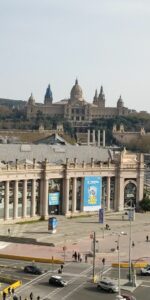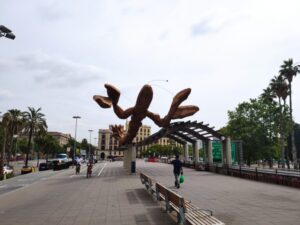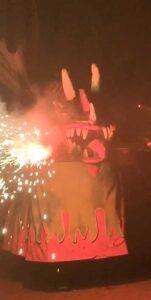As a part of Epitech Technology’s “Grande Ecole Programme”, students spend their 4th year of studies abroad. They can choose to study in one of our partner universities worldwide or they can study it on one of the Epitech campuses in Europe such as Berlin, Brussels or Barcelona.

But the choice to study in one of our European campuses is also possible for students in their 2nd and/or 3rd year. That was the case of Pierre (2024 Promotion) who, after completing his first two years of studies on the Epitech campus of Rennes, he decided to continue his 3rd year at Epitech Barcelona. We have recently got in contact with him and found out more about his experience abroad:
Why did you choose to continue your 3rd year of studies at Epitech Barcelona?
I believe that any opportunity should be seized. When the Pedagogical Director of Epitech Technology in Rennes approached me with the idea of studying abroad for a year, I was immediately interested. The choice was between Brussels, Berlin and Barcelona, but what made me choose the Barcelona was the climate.
How was your arrival on campus?
To be precise, I left for a week in July 2021 to apply for my NIE (Numero de Identificación deExtranjeros), which is necessary to have access to resident services: loyalty cards, “Bicing” – the equivalent of Velib in Barcelona…) and to find accommodation, before leaving a month later for the entire year.
When I arrived in August, my settlement went very well. Having already found the accommodation, I arrived with my belongings and just had to settle in. I had a few weeks before the Moonshot Pool started to explore the city and discover the local culture. The integration into the school was very smooth. The advantage of the Moonshot is that you quickly get to talk about the fields that interest you the most. We quickly get to know each other. Moreover, there were several French students in the same situation as me, which made things easier for us. Finally, the teaching staff helped to ensure that everything went as smoothly as possible: barbecue at lunchtime, invitations to the bar in the evening and, above all, a very friendly atmosphere on campus.
In your opinion, how is Spain and Epitech Barcelona perceived in the tech world?
Barcelona is the second most populated city in Spain after Madrid. It has more than 1,000 tech companies, more than 1,200 start-up headquarters and is the 5th largest investment hub in Europe.
The multiculturalism of Barcelona is also felt in the tech world, where the city is an international technology hub. For example, it hosts the Mobile World Congress, a major conference on mobile telephony, which is also used by major companies to present their products and technological advances. There are also a huge number of hackathons, conferences and tech events. Coworking cafes and companies in this sector are also very present, which makes it possible to make a lot of connections.

The city is very much committed to sustainable transportation. Many buses and taxis are electric, and the city has many charging points. The walkways are wide and many streets are pedestrianised. Crossing electric scooters, rollerblades, cyclists and pedestrians is much more common than in Rennes or even Paris.
Epitech Barcelona offers specific courses on the Smart-Cities industry and IoT (connected objects), in addition to the content of the Epitech programme. Courses on management, software development and project management are also offered: “The courses are in English, but you can also study in French, Spanish or Catalan, which makes the school accessible to everyone. A new addition this year is that Spanish courses are also available.
What are the main differences compared to France?
The differences between Spain and France are quite big, much more than I expected when I arrived. Spain is made up of provinces and each one has its own culture. The first thing that struck me was the languages. The official language in Spain is Spanish, Castilian, but several regions also have their own language (like Catalan).
When people talk to each other, they don’t have the same courtesy for a stranger that we have in France. People speak in the same way to a family member, a friend, a colleague, or to a complete stranger. This familiarity greatly enhances the feeling of being accepted and connected to others. Walking through the streets, you notice immediately when you go from one neighbourhood to another, each neighborhood has its own architectural style.

Spain is also about living in different time zone. Shops open later, but also close later in the evening. The lunch break is not at noon, it’s between 2 and 4 pm. I felt like I was jet-lagged at first, but you get used to it very quickly.
Another example: in France, Santa Claus comes through the chimney at the end of December to bring presents, in Spain it is the Three Wise Men who come at the beginning of January to put presents in the shoes on the balconies.
What is your best memory?
I think my best memory is during the Mercè festival, which honours the Virgin Mercè, the patron saint of Barcelona. It’s really something extraordinary. More than just a festival, it’s a whole week of festive moments. Catalan culture is very much emphasised and it is an opportunity to discover the whole city in detail. During the day, cultural activities are organised everywhere, and at night, there are parties in the streets. I really recommend people to visit this particular festival one day.

What advice would you give to a student who wants to do their 3rd year in one of Epitech Technology’s European campuses?
I advise them to learn about the culture of the country, and in the case of Spain, the province as well. Coming to live for a year is not just about tourism, it’s really about experiencing another way of living and integrating into the local life.
We would like to wish Pierre a wonderful end of his exchange year in Barcelona before going to Mexico soon for his fourth year of studies.
For more information about Epitech Barcelona click here.